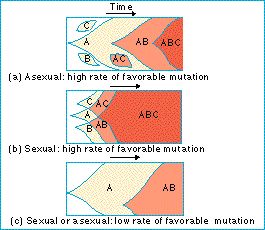Adaptations in sexual reproduction - Why do organisms reproduce sexually?

The group selection theory of sex
Perhaps the commonest answer to the question of why sex exists is that it speeds up the rate of evolution. This is the 'group selection' theory of sex. It accepts that sex is disadvantageous for the individual, because of its 50% cost; but claims that the cost is more than made up for by the faster evolution of the sexual population, or group. The sexual population would accumulate superior adaptations more rapidly and be able to out-compete an asexual population.
Group selection is a controversial subject, but here it is enough to note that most evolutionary biologists distrust theories that rely on advantages to whole populations. When individual and group-advantage conflict, individual selection is usually more powerful. We should therefore not expect to find adaptations that are disadvantageous for the individual even if they do benefit the group. Although sexual populations may evolve faster than asexual ones, it is still true that sexual individuals reproduce more slowly than asexual individuals; asexuality, once it has arisen, will tend to take over sexual groups. Asexuality can arise in a group by either mutation or immigration, and neither of these processes is likely to be, on an evolutionary time scale, all that rare: asexuality should therefore arise at a fairly high rate. The reason to be suspicious of group selection is that it requires the rate at which asexual females arise in sexual groups to be very low.
The argument against group selection can at best show that adaptations for the benefit of the group are theoretically unlikely, not that they are theoretically impossible.
Figure: evolution in (a) asexual and (b) sexual populations. In the asexual population, an AB individual can only arise if the B mutation arises in an individual that already has an A mutation. In the sexual population, the AB individual can be formed by breeding of a B mutation-bearing individual with an A bearing individual; the second mutation B is not needed. (c) If favorable mutations are rare, each will have been fixed before the next arises, and sexual populations do not evolve faster.
| Next |



